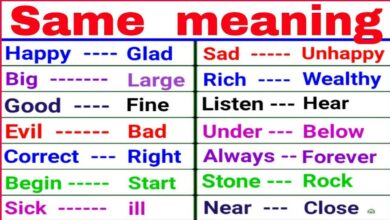
Why Macro Counting Isnt a Diet But a Way of Life
Why macro counting isnt a diet but a way of life – Why macro counting isn’t a diet but a way of life? It’s a question that’s been swirling in my head for a while now. You see, I used to think of macro counting as just another restrictive diet, another way to limit myself.
But then I realized, it’s so much more than that. Macro counting is about understanding your body, your needs, and your preferences, and making informed choices about the food you eat.
It’s about building a sustainable relationship with food, one that’s based on knowledge and awareness, not deprivation. It’s about fueling your body with the right nutrients, not just the right calories. And it’s about feeling good, both physically and mentally, because you’re taking control of your health.
Beyond the Numbers

Macro counting is more than just a diet; it’s a way of life that empowers you to understand your relationship with food and make informed choices for a healthier and more fulfilling lifestyle. It goes beyond simply restricting calories and delves into the intricate world of macronutrients, helping you decipher the building blocks of your meals and their impact on your body.
Understanding Macro Counting
Macro counting, or macronutrient tracking, involves monitoring your intake of carbohydrates, proteins, and fats. Each macronutrient plays a vital role in your body’s functions, and understanding their specific roles allows you to make informed decisions about your food choices. For example, carbohydrates provide energy, proteins are essential for building and repairing tissues, and fats support hormone production and cell function.
Macro Counting for Different Lifestyles
Macro counting can be adapted to fit various lifestyles, empowering individuals to achieve their health and fitness goals.
Athletes
Athletes often utilize macro counting to optimize their performance and recovery. By adjusting their macronutrient ratios based on their training intensity and goals, athletes can ensure they are consuming enough carbohydrates for energy, proteins for muscle repair, and healthy fats for hormone production.
Macro counting isn’t about deprivation; it’s about understanding your body’s needs and making informed choices. You can still enjoy your favorite foods, like pizza, within your macros! Check out this list of 11 healthy pizzas under 400 calories for some inspiration.
With macro counting, you’re not on a temporary diet, you’re building a sustainable lifestyle that allows you to indulge in delicious foods while reaching your goals.
This tailored approach helps them maximize their athletic potential and minimize the risk of injuries.
Busy Professionals
For busy professionals, macro counting can provide a structured approach to eating that fits seamlessly into their hectic schedules. By planning their meals in advance and tracking their macronutrients, they can ensure they are consuming a balanced and nutritious diet even when time is limited.
This helps them maintain energy levels throughout the day, improve their focus, and manage stress effectively.
Families
Macro counting can be a valuable tool for families seeking to adopt a healthier lifestyle. By involving children in the process of tracking macronutrients, families can learn about the different food groups and their nutritional value. This can foster healthy eating habits from a young age, promoting a positive relationship with food and reducing the risk of chronic diseases later in life.
Building a Sustainable Relationship with Food: Why Macro Counting Isnt A Diet But A Way Of Life
Macro counting isn’t just about hitting numbers on a spreadsheet; it’s about cultivating a mindful and balanced relationship with food. It empowers you to make informed choices, understand your body’s needs, and ultimately, achieve a sense of harmony with your eating habits.
Understanding Your Nutritional Needs and Preferences
Macro counting encourages you to delve deeper into the composition of your meals, analyzing the breakdown of macronutrients – proteins, carbohydrates, and fats – that make up each food item. This awareness fosters a greater understanding of your body’s unique nutritional requirements and preferences.
By tracking your macros, you gain valuable insights into how different foods affect your energy levels, satiety, and overall well-being. This knowledge empowers you to make conscious decisions about your food choices, ensuring that you are fueling your body with the nutrients it needs to thrive.
Benefits of Macro Counting Compared to Traditional Dieting
| Feature | Macro Counting | Traditional Dieting |
|---|---|---|
| Focus | Sustainable lifestyle change | Short-term weight loss |
| Approach | Mindful eating and personalized nutrition | Restrictive and often unsustainable |
| Flexibility | Allows for flexibility and customization | Often rigid and inflexible |
| Long-Term Health | Promotes long-term health and well-being | May lead to rebound weight gain and nutritional deficiencies |
Beyond the Kitchen
Macro counting, often viewed as a dietary tool, extends far beyond the confines of the kitchen. Its impact resonates deeply with our physical well-being, mental health, and overall quality of life. By understanding how macro counting influences these aspects, we can harness its potential to achieve holistic wellness.
Macro counting isn’t about restriction; it’s about understanding your body’s needs and fueling it with the right nutrients. It’s a tool for building healthy habits, not a temporary fix. And when you’re ready to take your healthy journey to the next level, check out these 10 Simple Changes That Lead to Weight Loss for more inspiration.
Macro counting helps you become more mindful of what you eat, which translates into sustainable changes that support long-term health and well-being.
Impact on Physical Performance and Energy Levels
The foundation of macro counting lies in understanding the macronutrients—proteins, carbohydrates, and fats—that fuel our bodies. By carefully adjusting our intake of these macronutrients, we can optimize our physical performance and energy levels. Proteins are the building blocks of muscles, essential for growth and repair.
A balanced protein intake, tailored to individual needs, can enhance muscle recovery after workouts, leading to improved strength and endurance. Carbohydrates provide our bodies with energy, particularly during exercise. Strategic carbohydrate intake, timing it with workout routines, can improve athletic performance, increase stamina, and reduce fatigue.Fats, often misunderstood, play a vital role in hormone production, cell function, and energy storage.
A healthy fat intake, rich in omega-3 fatty acids, can enhance cognitive function, improve heart health, and promote overall well-being.
“Macro counting allows you to tailor your diet to your specific needs, ensuring you have the right fuel for your body’s demands.”
Impact on Mental Health and Emotional Well-being, Why macro counting isnt a diet but a way of life
The link between diet and mental health is increasingly recognized. Macro counting, by promoting a balanced and mindful approach to eating, can positively influence mental well-being. By providing a structured framework for meal planning, macro counting can reduce food anxiety and promote a sense of control over dietary choices.
This can be particularly beneficial for individuals with eating disorders or disordered eating patterns. Furthermore, macro counting encourages awareness of the relationship between food and mood. By identifying trigger foods or dietary patterns that negatively impact mental health, individuals can make informed choices to support emotional well-being.
“Macro counting can empower you to break free from restrictive diets and develop a healthier relationship with food, fostering a sense of mental clarity and emotional stability.”
Tips for Incorporating Macro Counting into a Holistic Wellness Routine
- Start Small and Gradually Increase Complexity:Begin by focusing on tracking your macronutrients for a few meals per week, gradually increasing the frequency as you become more comfortable with the process.
- Seek Professional Guidance:Consult with a registered dietitian or certified nutritionist to personalize your macro goals and create a sustainable plan tailored to your individual needs and health goals.
- Prioritize Whole Foods:Emphasize nutrient-dense foods such as fruits, vegetables, lean proteins, and whole grains, while minimizing processed foods and sugary drinks.
- Listen to Your Body:Pay attention to hunger and fullness cues, adjusting your macro intake based on your body’s individual needs and energy levels.
- Embrace Flexibility:Macro counting is a tool for mindful eating, not a rigid rule. Allow for occasional indulgences and prioritize enjoyment in your food choices.
The Power of Flexibility and Personalization

One of the most empowering aspects of macro counting is its adaptability. It’s not a rigid diet; it’s a framework that can be tailored to your individual goals, preferences, and lifestyle. This flexibility allows you to achieve your desired outcomes while still enjoying the foods you love.
Macro counting isn’t about restriction, it’s about understanding how your body utilizes nutrients. And a key part of that is ensuring you’re getting enough veggies! Check out these 5 ways to up your vegetable game for some inspiration.
By focusing on nutrient-dense foods like vegetables, you’ll naturally hit your macro targets and feel your best, proving that macro counting isn’t a temporary diet, but a sustainable way of life.
Different Macro Counting Approaches
Macro counting offers various approaches, each with its own set of guidelines and benefits.
- Flexible Dieting:This approach emphasizes a balanced intake of macronutrients while allowing for flexibility in food choices. It’s based on the principle of “If it fits your macros,” meaning you can enjoy a variety of foods as long as they fit within your daily macro targets.
For example, you could have a burger and fries one day and a salad with grilled chicken the next, as long as both meals align with your macros.
- Ketogenic Macro Tracking:This approach focuses on a high-fat, moderate-protein, and very low-carbohydrate diet. It aims to induce ketosis, a metabolic state where the body primarily burns fat for energy. Individuals following this approach typically track their macros to ensure they stay within the ketogenic range.
Adjusting Macro Targets
Your macro targets should be adjusted based on your individual needs, activity levels, and progress.
- Individual Needs:Factors like age, gender, and body composition can influence your macro requirements. For example, a highly active individual might need more protein and carbohydrates than someone with a sedentary lifestyle.
- Activity Levels:Your macro targets should reflect your activity levels. If you increase your exercise intensity, you might need to adjust your macro intake to support your energy needs.
- Progress:If you’re not seeing the desired results, it might be necessary to adjust your macro targets. For example, if you’re trying to lose weight but aren’t seeing progress, you might need to reduce your calorie intake or increase your protein intake.
“The beauty of macro counting lies in its ability to adapt to your individual needs and goals. It’s not about following a one-size-fits-all approach; it’s about finding a personalized strategy that works for you.”
Embracing a Balanced and Joyful Approach to Food
Macro counting, often perceived as a restrictive diet, can actually be a powerful tool for fostering a balanced and enjoyable relationship with food. By understanding your nutritional needs and making informed choices, you can break free from restrictive eating patterns and embrace a more flexible and fulfilling approach to eating.
Overcoming Restrictive Eating Habits
Macro counting can help individuals overcome restrictive eating habits by providing a structured framework for making food choices. Instead of focusing on eliminating entire food groups or adhering to rigid meal plans, macro counting encourages a more flexible approach where you can enjoy a variety of foods while still meeting your nutritional goals.
By tracking your macronutrients, you can identify areas where you may be over-restricting and adjust your intake accordingly. This allows you to enjoy your favorite foods in moderation, fostering a healthier relationship with food that prioritizes balance and enjoyment.
Last Recap

Macro counting isn’t about perfection, it’s about progress. It’s about finding a balance that works for you, and that you can maintain for the long haul. It’s about making healthy choices that support your overall well-being, and that help you live a happier, healthier life.






